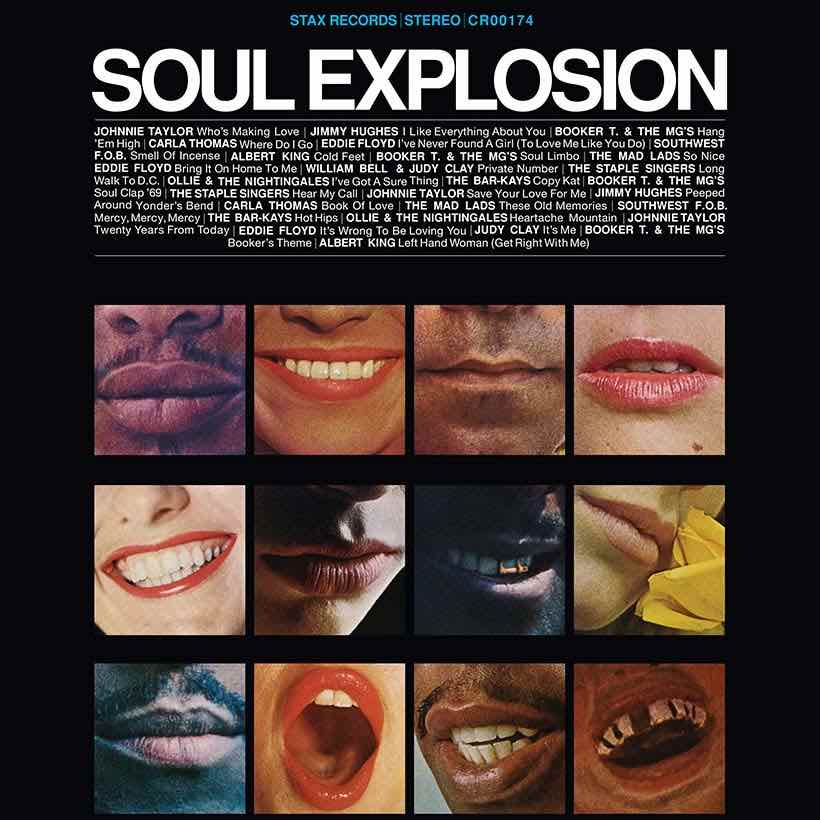It was by no means certain that Stax would survive the turmoil of 1968, yet here it is in 1969, proud, loud, and thrillingly soulful. The iconic soul record label’s distribution deal with Atlantic had collapsed, which cost the company its back catalog and one of its biggest acts, Sam & Dave. The company’s home city, Memphis, had witnessed rioting after the Reverend Dr. Martin Luther King was assassinated there. Otis Redding, Stax’s musical figurehead, had passed away in December ’67, and so had several members of The Bar-Kays, the band that represented the up-and-coming funky side of the label. But as it entered 1969, having set about building a brand-new catalog of great records to sell across 1968, Stax’s attitude was clear: onward and upward. And the Soul Explosion double-album, released in November 1969, was like a banner for the label to shimmy behind: it said, We are still here, our soul revolution is only in its infancy, and you ain’t heard nothin’ yet.
Listen to Soul Explosion on Apple Music and Spotify.
Getting it all together
The remarkable thing about it was: Stax was right. Its company motto for ’69 was “Getting it all together,” and it surely did. Stax still had loads of fuel in its tank, as Soul Explosion made clear.
It’s worth bearing in mind here that Stax’s approach to a compilation was slightly different to that of other soul labels. When Stax put together a soul comp, it wasn’t just trying to sell as many records as possible and squeeze more juice out of old material. It was trying to shine a light on the deeper recesses of its contemporary catalog and deliver real soul, true soul; its mission was as much to get this music heard and loved as it was to sell truckloads of vinyl. Soul aficionados knew what they were getting would be the real deal.
That’s not to say there were no hits on Soul Explosion. Hits were plentiful on a 28-track double-album that could tempt both soul insiders and casual buyers alike. Johnnie Taylor’s sassy ”Who’s Making Love,” Booker T & The MGs’ “Soul Limbo” and “Hang ’Em High,” William Bell & Judy Clay’s “Private Number,” Eddie Floyd’s “I’ve Never Found A Girl (To Love Me Like You Do),” the reconstructed Bar-Kays’ “Copy Cat”: these classics represent soul heaven as heard and loved by non-specialist music fans on both sides of the Atlantic. But there’s a lot more on Soul Explosion, and some of it was scarce even then and has evaded reissue until now. It’s Stax soul at its deepest.
One of the greatest soul compilations of the 60s
Soul Explosion included two tracks from Jimmy Hughes, for whom the company had high hopes. His sole album for the label was produced by Stax boss Al Bell, and “I Like Everything About You” was a decent-sized R&B chart hit. Much-worshipped blues star Albert King offered a brace of goodies, “Cold Feet” and “Left Hand Woman (Get Right With Me),” neither drawn from his contemporary Stax albums, showing he had strength in depth. Stax’s Memphis Queen, Carla Thomas, also struck a blues feeling on “Book Of Love,” a tough boogie with Steve Cropper’s chopping guitar behind her, and hits a sweeter mood on a song from the fashionable musical Hair, “Where Do I Go,” which suggests she could have become a mainstream pop artist – with extra soul.
Stax is not commonly remembered as a hub of vocal-group soul, but two of its strongest acts of the era were among the 60s’ best hamonizers: The Mad Lads offered a delightful doo-wop-derived innocence on “So Nice,” a minor R&B hit, and “These Old Memories,” where a typical Stax horn and rhythm section offer an elegant, stately alternative to the usual uptown vocal group sounds. Ollie & The Nightingales released their sole Stax album in ’69, but the two songs from this grittier, more Southern-sounding outfit did not feature on it. “I Got A Sure Thing” was a minor pop hit as a single in ’68, with a silky string section contrasting heavily with Ollie Hoskins’ vocal testifying; “Heartaches Mountain” is tougher stuff, perhaps inspired by Lee Dorsey’s 1966 B-side “Operation Heartache.” Both of those groups should have become far bigger stars than they did.
Best Stax Vocal Groups: 11 Essential Acts You Need To Hear
Soul & Pop Superstar Isaac Hayes Scores With “Shaft”
A Celebrating 60 Years With Stax Records
One band’s tracks don’t fit the album’s declared genre. Southwest FOB were a rock quartet allocated to Stax’s Hip imprint; “Smell Of Incense” is a full-on psychedelic outing and the title track of the group’s sole album; “Mercy, Mercy, Mercy” is more soulful, a version of the Cannonball Adderley hit written by Joe Zawinul. However, Stax’s talent radar was working, albeit too early: half the group went on to find success as England Dan & John Ford Coley.
Soul Explosion ranks among the greatest soul compilations of the 60s, but it is a snapshot of its moment; Stax’s imminent future as true heavyweights of the early 70s is only hinted at here. Within months of the album’s release, Isaac Hayes would overturn soul conventions with his remarkable Hot Buttered Soul. The label’s oncoming status as a vital source of soulful social commentary is present only in Johnnie Taylor’s pointed but entertaining “Who’s Making Love,” and on a more serious level in The Staple Singers’ two cuts, “Long Walk To DC” and “Hear My Call,” though producer Al Bell had yet to find the funky formula that made their folk-gospel roots into funky smashes.
A game-changing year, 1969 was indeed a Soul Explosion for Stax. This remarkable record presents the music that drove the legendary label to that remarkable point.




